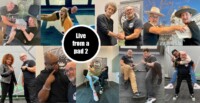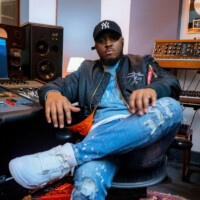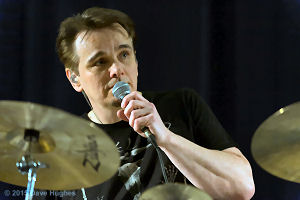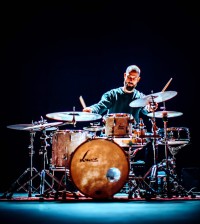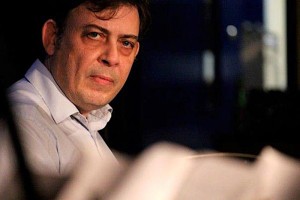 Celebrating 40 years in jazz, Clark Tracey is well established as one of the UK’s finest jazz drummers.
Celebrating 40 years in jazz, Clark Tracey is well established as one of the UK’s finest jazz drummers.
Son of UK jazz legend Stan Tracey, Clark got introduced to jazz at birth and very quickly stepped out of his fathers shadow to establish a successful career in his own right.
Over the years Tracey has played with the likes of Ronnie Scott, Johnny Griffin, John Hicks, John Surman, Kenny Wheeler, to name a few, while recording over 100 albums and touring more than 50 countries.
Off the drum chair, Clark works relentlessly to keep the UK jazz scene alive, being the organiser of the Herts Jazz Festival, weekly concert nights in and around London and constantly introducing new, young players to the scene.
I caught up with Clark to chat about his upbringing, his experience with different audiences around the world and his various engagements in the British Jazz scene.
You grew up in a very musical household and started off on piano and vibraphone.
Yes, they were the instruments that were immediately to hand as I was growing up. I also played some violin and clarinet. Literally just everything that was lying around at the time.
Was the fact that they were all melodic instruments influenced by your dad who was a professional piano player?
Yeah it was. I read interviews of my dad where he says that from the moment I arrived home from the hospital I was listening to jazz. So when I say it was natural, I really mean it. I can’t think of anything else ever being played in my life except jazz. It was very normal to me and I didn’t really notice that other kids weren’t listening to jazz till I went to school. I was a very shy kid too so I didn’t make many friends. I had to integrate a little and that’s when I realised how different I really was from everybody else. Nobody had heard of jazz and obviously they didn’t enjoy it either.
Streatham, where I grew up in the ’70s, didn’t have a jazz club so you had to head into London for it. Pretty much like today.
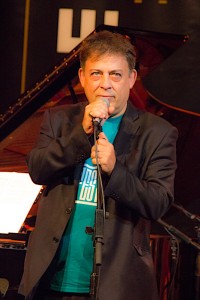 So your dad was a big influence on your whole musical upbringing?
So your dad was a big influence on your whole musical upbringing?
Yes, it was kind of all that I was aware of. It’s struck me many times since how distanced many of my friends had been with their parents and I think it was a very fortunate thing for me that we shared this music. I didn’t think it was unusual to being doing this, I thought it was unusual my friends weren’t spending time listening to music with their parents. I couldn’t relate to anybody my own age for years.
Did you play music in school then or did your different musical taste make that impossible?
When I went to grammar school when I was 11, there were only three boys (out of one hundred kids) who were taking music. And that was classical music. Very classical. Although I had classical albums and liked listening to it (again, mostly because of my fathers taste in music), the interests were more Shostakovich, Schönberg, Debussy and Ravel. At school I was given a healthy dose of Beethoven. Everything else was scoffed at.
In order for me to take music at school I had to take up an instrument. I didn’t really know what I wanted to do so they handed me a violin. You know how hard it is to learn the violin so there was no immediate rapport with me, I really had trouble. At home I was playing vibes with my dad, and piano from as early as I can remember.
Then a drum kit arrived at our house when I was 13. That luckily superseded the need for me playing the violin at all. So one day I went to the headmaster and insisted that I’d stop taking those damn violin lessons. I told him that I was out performing on the drums and that I wanted to become a drummer. Again everybody scoffed at that idea – or a jazz musician, even worse. Fun days. I was very isolated with that.
There were no colleges in the 70s by the way. Everyone assumes I went to music college but there was nothing. There was jazz summer school for two weeks which my mum used to run, that was it.
Where did the drums come from then?
That was pure fluke. A friend of ours had to leave the country and we looked after his drum kit for him. He agreed to let me have a play on it and that was it, I was pretty much hooked immediately. I was watching my dad’s drummers at the time, first John Stevens and then Bryan Spring. Bryan was my dad’s regular drummer and is a phenomenal player. A lot of people don’t know who he is now which is tragic because he’s one of the greatest drummers we’ve ever had, and he’s still around.
I wanted to emulate that, I just wanted to be like Bryan. Even now.
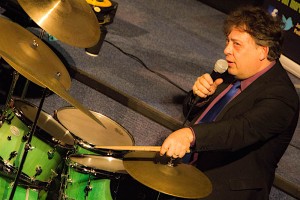 How did you pick it up? Did Bryan give you lessons?
How did you pick it up? Did Bryan give you lessons?
They weren’t really lessons, more moments of advice. I knew I had to practise but I really wasn’t interested in it. I didn’t do the regular ‘sitting down doing the rudiments’-thing, which now I tell all my students is paramount to do.
Bryan back then then gave me a great book by Charles Wilcoxon. I was learning things from there and was aware about rudiments in that regard, but to actually sit down and practise for hours just never happened till much later on.
And then you started playing with your dad?
Yes. Bryan left the band over night and after discussing it my parents decided that I was ready to join the band as far as my knowledge of his music went. The only thing I had practised up till then was playing along to my dad’s tapes. And because I used to go to all the concerts I knew exactly how the whole operation worked, the etiquette on stage and everything surrounding the gig.
That was it. From 1978 I was on the road with Stan for another 35 years.
You wrote a book about your father too?
Yes. The book was just something I wanted to do because no one had written anything about Stan before. People had asked him a lot if he wanted to do an autobiography but he wasn’t interested. That was just the guy he was. He very much lived for the moment and never looked back at his achievements. When he died I had the opportunity of just piecing things together for myself really and then a publishing company asked me if I wanted to make it into a book. I had already started so I thought ‘let’s do this’. It was obviously supposed to happen and I’m very glad I did it.
You also started playing a lot for American artists?
Yeah. I talk to my students a lot about being at their age and more interested in smoking, drinking and girls than doing what I was supposed to be doing on the drum kit. It took a long time till I started taking myself more seriously – I think I was 21. When you take yourself seriously, other people will take you seriously. It’s really obvious to people when you’re taking the piss. Up till then nobody was booking me apart from my father, but then the phone started ringing and it didn’t stop. Mostly I was asked to dep for people, which I’m still doing a lot, but a lot of the time I was asked to do longer jobs too. At that time there were a lot of visiting Americans. I have some great memories with artists like Pharaoh Sanders, Johnny Griffin, Bud Shank… there is a huge list of people. Those opportunities aren’t really there now for young players I guess, which is a pity because it’s a crucial time of learning. Yes you can fly out to New York and just go: right, I’m here. So are thousands of other drummers. Good luck finding people of that quality who want to work with you.
My dad, for example, was the house pianist at Ronnie Scott’s in the 60s, so he was there every night for seven years playing with the best musicians in the world. He always said: “Why would I want to go to America? I would never meet these people there.” Here he played with them for a month and the learning curve was huge. Luckily I had a similar experience and got to play with some of my heroes.
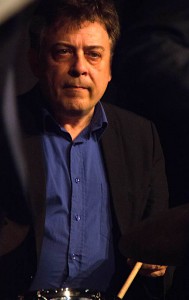 You mentioned students earlier. Do you teach a lot?
You mentioned students earlier. Do you teach a lot?
I’m a visiting tutor at Birmingham Conservatoire. I’ve been doing that for seven years now. It’s great. Before that I’d been teaching at schools, but that’s pretty soul destroying stuff. After a year the guy still can’t hold his sticks. I was really only doing that for the money.
I’m very glad to be at the Conservatoire because now I’m teaching guys 17 upwards who are there for a reason.
You released a book too: ‘Exploring Jazz Drums’?
Yes, that was with a German company called Schott. They realised they didn’t have a jazz tutorial in their series yet so they approached me. That was a few years ago now. I’d love to hear back from them to see how the book is doing and maybe talk about a second part.
Talking about Germany: you did a lot of gigging there too, right?
Yeah, Germany has a big jazz scene. I replaced Tony Levin in a band called ‘The European Jazz Ensemble’ which consists of mainly German musicians. They’re located in Düsseldorf so I spent the last five years travelling between here and there.
It’s always interesting playing to international audiences. My experience after all these years is that playing to the Brits is that they take it for granted quite a lot. Maybe that’s true for every indigenous musician in their own country but it’s true here. I just really enjoy that people don’t know me when I’m playing abroad, so that every time I play I have to proof myself for the first time. There are no hooks, angles or “oh he’s Stan Tracey’s son”. They just decide whether I’m good or not by my drumming. When I play in this country I sometimes know the whole bloody audience.
You just mentioned it yourself: can it sometimes be annoying to be the ‘son of Stan Tracey’? After all you are an artist in your own right.
It used to piss me off when it came to my writing. Some of my compositions I was very happy with but when you’d read a review about it, there would be the constant comparison to my dad. They’re not saying it’s better or worse but they always say “well, what do you expect”. If I perform my material in other countries the audience will judge whether it’s good or not and at least I know the truth. It’s never bothered me to be ‘Stan Tracey’s son’, I’ve had this in print for 40 years. People actually still come up and ask me how he is. It is what it is and mainly I’m proud to be his son!
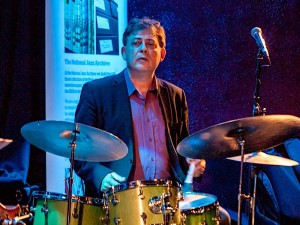 You’re celebrating 40 years of jazz this year with a new album and a brand new quintet?
You’re celebrating 40 years of jazz this year with a new album and a brand new quintet?
Yes. That’s another tag I have: I’m not only the son of Stan, I’m also the British Art Blakey! Art Blakey and the Jazz Messengers always brought in younger faces and introduced the world to these marvellous young players. I’ve been doing a similar thing for a number of years now. It’s not difficult finding these guys. I’ve got a bit of a f**ked up policy about this really: When the band hits a certain level something in me says it’s time to change. The great thing at that level is that the intuition is huge and you can trust each other completely. Maybe there is something about wanting to impart that feeling to younger players. Yes I could just get to that level and stay with with a band but I prefer to work with other players, introducing them to that and playing new material.
It’s an exciting time for me deciding who’s gonna be in the band too. The two new horn players I have for example are fantastic. They just blew me away but I’ve been listening to them for three years already. They were 13/14 years old the first time I heard them and I already knew they would be incredible. It’s not just the facility and reading ability, that’s never what I’m after. It’s much more than that. It’s being able to understand and comprehend what makes this music work. There are little things along the way that I know I’ll have to mould. If I see an ego rising for example, that would screw up the whole band. Rather than losing a musician I just sit down with them and talk it through.
With this new band we only started in January and had quite a lot of gigs already. That’s the scary thing actually: will people still book me with my new band. The people who book gigs usually don’t know anybody in the band at the start, but once they mature and get better known bookers keep asking for players back.
The album is called ‘No Doubt’, it’s released on my own label and has been available since the 1st of September. It’s also available on Amazon and all that. That’s the funny thing: all these young people in my band don’t buy CD’s anymore, they’re back to vinyls. It’s weird!
You won the ‘Best Jazz Drummer’ award 6 or 7 times now. What’s the key?
I think that particular award (The British Jazz Awards) has a lot to do with the your popularity on the road – because it’s a public vote. So if I’ve had a really good year and have been out and about seeing people at festivals and gigs, they might see my name come up and vote for me. Other than that I’m not quite sure.
A good friend of mine who won it too, guitarist Jim Mullen, said “winning it is like the kiss of death. You don’t work for a year after that.” [laughs] And there is an element of truth to that. I had that last year. I had just won that award and nobody was booking me.
Oh. Why do you think that is? Are people intimidated or think you’re too busy already?
Oh I wouldn’t want to intimidate anybody, but for example when I was in my 20s, the thought of booking an established 57 year-old drummer wouldn’t really come into the equation. You would maybe think ‘I would like to do a gig with him one day’ but you’d also think ‘why would he want to work with me?’. I was like that too. Obviously I would like to play with anybody and I really don’t want to lose touch with the business. A lot of friends my age don’t know the young players anymore so they really just end up with their own clique, the 50, 60, 70 year-olds and the thought of playing with an 18 year-old is unimaginable to them. I’ve just booked a piano player for a few gigs who is 17 years old. He’s astonishing. It doesn’t mean he’s better than all the guys I’ve ever worked with but one of the reasons I booked him is because I want to connect.
You almost struggle getting them into the clubs at that age…
You’re right! My alto player just turned 18 a few weeks ago. We just had our first gig at Ronnie Scott’s come in and the first thing they asked me was if he’s 18 yet because they can’t have people in that are 17. That’s mad.
You’re the organiser of the Herts Jazz festival and put on weekly jazz nights in Hertfordshire too. That’s an incredible engagement into the UK jazz scene.
My mum is an unsung hero of British jazz. She set up some jazz summer schools in the 70s, ran a jazz club and put three different committees together to push the music in various ways. I used to watch her doing this as a teenager and I think a lot it has rubbed off. It’s all about the necessity of it because if I don’t do it, it’s just not gonna be there.
The Herts Jazz Festival is the perfect example. The night I played there they were celebrating their 40th anniversary and they were closing that night. I had played there for 25 years and thought it would be a huge shame if it wouldn’t continue – and if I was crazy enough to want to do this. Nine years later we’re still running: we’ve got a bigger audience, a better venue and we’re doing weekly instead of monthly. There are lots of reasons why it can and should be done.
I’m very glad we’re still doing it. It is providing music for another generation that hasn’t heard this stuff before live and makes them aware of how diverse jazz really is.
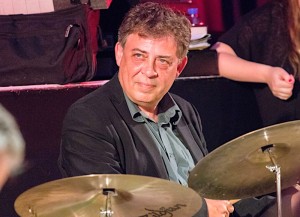 Tell me about the weekly jazz night.
Tell me about the weekly jazz night.
We changed the location form Welwyn to St. Albans. The venue is a proper studio theatre now which holds 130 people and has a grand piano in there. There is a great vibe in there and the whole atmosphere is geared towards a great listening night. We’ve lost some of our punters who didn’t want to make the way over but we’ve also gained lots of new ones. Our membership has gone up since moving there which I’m very happy about. I’m currently toying with who to book. Sometimes people treat these jazz clubs as social clubs and only want one particular style of jazz. I’m trying to widen the boundaries a little with the ultimate goal of bringing more people into the venue – obviously I don’t want to go too crazy with it.
The venue is too small for the festival which is why we’ve moved that to Letchworth in the north of Hertfordshire. This year is the first time we’re up there and we have a lovely old theatre to hold it in.
And finally, what’s next?
We have the Herts Jazz Festival coming up from the 5th to the 7th of October. There are still some tickets left so go and check it out.
Generally the answer I usually give is that I want to work abroad more. I’ve been round and round the country so much and I love them all but there has got to be a different colour in my life. At the moment I’m actively trying to get to Japan so I’m ringing people offering my skills, lectures about British jazz or teaching. I have done a lot of travelling and I’m really glad about that but I don’t want it to be something that I ‘did’.
Thanks a lot for your time Clark!
Interview by Tobias Miorin
September 2018

